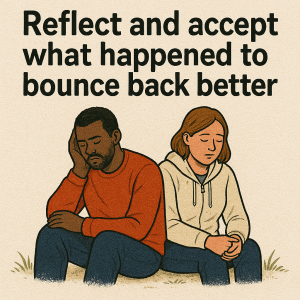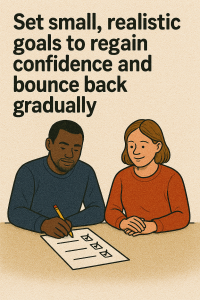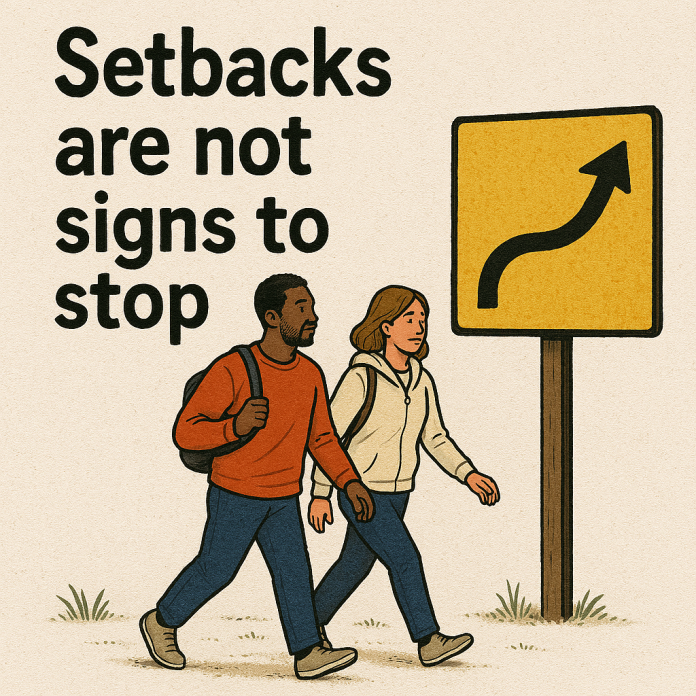Setbacks are not signs to stop. They are signals to rise, reflect, and restart with more wisdom than before.
Bounce back from setbacks—this is something every working adult in Sarawak will face at some point in life. Whether you’re a young executive in Kuching, running a small café in Bintulu, working in public service in Sibu, or handling side projects while raising a family in Miri, setbacks are part of the journey. Sometimes, your idea gets rejected. Maybe a client doesn’t respond, or a team project doesn’t meet expectations. Other times, you feel like you’re trying your best, but still falling behind. It’s not easy—and it can leave you feeling tired, frustrated, or even like giving up.
But here’s something important to remember: setbacks are not a sign to stop—they are a signal to grow. They are part of what makes us stronger. If we take time to reflect, get support, and learn something new, we can come back better. That’s what it means to bounce back from setbacks—to rise again with more wisdom, more strength, and a clearer sense of direction.
For working adults in Sarawak, time is always limited. Between work, family, and personal responsibilities, it’s hard to commit to long or expensive training courses. That’s why tools like microlearning through FAME Meta are so helpful. With short, simple courses you can take anytime—on your phone or laptop—you can continue improving yourself without taking time away from your job or family.
In this article, we’ll explore five (5) easy but powerful ways to help you recover from setbacks and move forward with confidence. These ideas are practical, realistic, and made for people like you—busy, hardworking Sarawakians who want to keep going, keep learning, and keep growing.
1. Reflect and Accept What Happened to Bounce Back Better

The first and most important step to bounce back from setbacks is to take time to reflect and accept what happened. Many people, especially those who are constantly busy juggling work, family, and other commitments, feel the need to move on quickly after something goes wrong. We think, “Never mind, just keep going,” or “Let’s forget about it and focus on the next task.” But if we skip the process of reflection, we miss a valuable chance to learn and grow.
Reflection is not about blaming yourself. It’s not about feeling guilty or getting stuck in regret. It’s about understanding the situation clearly and honestly. Ask yourself—what really happened? What were the reasons things didn’t turn out as expected? Was it something you could control, like being underprepared or not asking enough questions? Or was it something external, like last-minute changes from the client, or a lack of resources?
Take the example of Zainab, a young marketing executive working in Kuching. She spent a whole week preparing a detailed pitch for a potential client—late nights, careful research, and designing slides with her team. But when the day came, the client decided to go with a different agency. At first, she was crushed. She felt like all her effort had been wasted. She even started doubting herself.
But instead of rushing into another project just to distract herself, Zainab took a step back. She reached out to her supervisor and asked for feedback. They went through her pitch together, and her supervisor pointed out areas that could be stronger—like storytelling and focusing more on the client’s emotional needs. Zainab also realised that she was speaking too fast during the presentation because she was nervous. From that experience, she started working on her public speaking skills and signed up for a short communication course through e-learning platforms.
By allowing herself time to reflect instead of brushing it off, Zainab didn’t just move on—she moved forward, with clarity and purpose. And that’s the key difference.
In Sarawak, where many people are raised to stay humble and not make a fuss, we sometimes keep quiet about failure. But talking about it, writing it down, or simply thinking it through honestly is powerful. Reflection helps you deal with the emotions, understand the reality of what happened, and prepare your mind for what’s next. It’s not a weakness—it’s a smart and mature way to grow.
Remember: before you can bounce back, you must understand where you fell and why. Only then can you rise again—not just as the same person, but as a wiser, stronger, more grounded version of yourself.
2. Set Small, Realistic Goals to Regain Confidence and Bounce Back Gradually

Once you’ve accepted your setback and taken time to reflect, the next step is to slowly start moving forward. But here’s the thing—you don’t have to fix everything at once. Many of us, especially hardworking professionals in Sarawak, tend to push ourselves too hard after a disappointment. We feel like we have to prove something or recover fast. But in truth, the most effective way to bounce back is to go step by step.
Set small, realistic goals. These are goals that you can manage without feeling overwhelmed. They should be achievable and focused on specific actions you can take right now. Don’t aim to rebuild everything overnight. Start with one thing. Focus on progress, not perfection.
For example, if your online business didn’t hit the target during the festive season, don’t immediately stress about launching a whole new product line or revamping your website in one weekend. Instead, look at one small area you can improve—maybe your product descriptions, the way you reply to customer messages, or how you present your items in photos. One small improvement can already make a big difference.
Take the story of Jason, a home baker from Sibu who sells kek lapis and cupcakes. Last December, his festive orders were lower than expected. At first, he felt discouraged and thought about giving up. But then he decided to look closely at what could be better. He realised his packaging looked too simple and didn’t reflect the festive mood. So instead of making drastic changes, he started small—he upgraded his box design, added handwritten thank-you notes, and took brighter, cleaner photos to post on his social media.
The results didn’t come instantly. But within a few weeks, his orders started picking up. Customers began to take notice. Some even complimented him on the thoughtful packaging. Most importantly, Jason felt proud again. That confidence gave him the motivation to try more improvements. Bit by bit, those small changes helped him rebuild his brand—and his self-belief.
This is the power of small, realistic goals. They don’t feel scary. They don’t demand too much time or energy. But they create momentum. And when you see yourself making progress, even in small ways, it builds your confidence to take on bigger things later.
So don’t rush. Don’t pressure yourself to bounce back all at once. Take it one goal at a time. With every small win, you’re not just fixing a situation—you’re rebuilding your strength, one step at a time.
3. Learn New Skills to Bounce Back Smarter with Microlearning from FAME Meta
If you’re feeling stuck, unsure of what to do next, or like you’ve lost some confidence after a setback, one of the best things you can do is to learn something new. But let’s be honest—when you’re already busy with work, family, and daily responsibilities, the idea of going back to study or attending long training sessions can feel impossible. This is where microlearning can be a game-changer.
Microlearning is a simple, practical way to pick up new skills without taking up too much of your time. It’s all about short, focused lessons that you can complete in just a few minutes a day. You don’t need to sit for hours in a classroom or attend full-day workshops. With microlearning, you can study while waiting for your food at the kopitiam, during your lunch break at the office, or even while sitting in the car waiting to fetch your kids. It fits into your life—rather than making you change your schedule.
One great platform for this is FAME Meta. This online learning site is specially designed for working adults who still want to grow but don’t have the luxury of time. It offers a wide range of CPD-certified courses (Continuing Professional Development), which means the lessons are not only practical—they’re recognised and valuable for your career growth.
FAME Meta’s courses are affordable, easy to understand, and available in topics that really matter to professionals today—like communication, leadership, productivity, and digital skills. You don’t need to commit your whole weekend. All you need is your smartphone and a few spare minutes each day.
Take Zainab, for example. She’s a marketing executive in Kuching who recently lost a client after a pitch didn’t go as planned. She felt disappointed but didn’t want to stay stuck. So during her daily commute on the bus, she opened up the FAME Meta app and started a short course on “Effective Business Communication.” In just a few lessons, she picked up tips on how to present ideas more clearly, handle questions better, and connect with her audience with more confidence. The best part? She didn’t have to take leave from work or spend hundreds of ringgit on a seminar.
Microlearning may feel small, but the impact is big. It helps you build new knowledge, boost your confidence, and show yourself that you’re still moving forward—even after a tough moment. And in Sarawak, where people value practical effort and self-improvement, it’s the perfect fit for those who want to bounce back without putting their life on hold.
So if you’re not sure what your next step is, start by learning something new—even if it’s just for 20 minutes a day. It’s a simple, smart way to recharge your skills and rebuild your spirit.
4. Seek Support to Help You Bounce Back With Strength and Community
One of the most important things to remember when trying to bounce back from setbacks is this—you don’t have to do it alone. In fact, trying to carry everything by yourself can make the journey harder than it needs to be. Many of us, especially in Sarawak, are brought up to be tough, independent, and “just deal with it quietly.” But the truth is, reaching out and talking to someone doesn’t make you weak—it makes you wise.
When you’re feeling stuck, tired, or unsure of what to do next, having someone to talk to can make all the difference. Sometimes, just saying your thoughts out loud helps you see the situation more clearly. Other times, someone else might offer a perspective or solution you hadn’t thought about. Whether it’s a colleague at work, your team leader, a close friend, a mentor, or even someone from your community group—support is everywhere, if you’re willing to ask for it.
Sarawak is known for its strong sense of community. People help each other, and that’s a beautiful strength we should always make use of. Take Jason’s story, for example. After his small baking business in Sibu didn’t perform well during the Christmas season, he felt discouraged and alone. Sales were slow, and he didn’t know what to change. Instead of staying silent, he joined a local Facebook group for Sarawak home businesses. He started asking questions and sharing his experiences honestly.
To his surprise, many others had gone through the same problem. Some gave him tips on better packaging and pricing strategies. Others shared tools and apps they used for managing orders and promotions. In just one month of being part of that group, Jason learned more than he did in the past year by trial and error. He also felt less alone—and that gave him the motivation to try again.
Support doesn’t always have to come in big ways. Sometimes, it’s just someone who listens when you need to vent. Sometimes, it’s reading a post from someone else and thinking, “I’m not the only one.” The important thing is to know you don’t have to keep everything inside. Sharing your burden lightens the load, and it also opens the door for help, new ideas, and emotional relief.
So if you’re feeling overwhelmed after a setback, take a deep breath—and reach out. You’ll be surprised how much better things can feel when someone walks with you, even just a few steps of the way.
5. Share Your Story to Help Others Bounce Back Too
After you’ve taken the time to reflect, picked yourself up, and started moving forward again, there’s one more powerful thing you can do—share your story. It may sound small, but it has a huge impact, not just on others, but on yourself too. When you talk about your setbacks and how you managed to bounce back, you remind yourself of how far you’ve come. And you also give someone else the courage to keep going.
You don’t need to share it on social media or speak on a big stage (unless you want to!). Sharing can be simple and personal. It can be a quiet one-on-one conversation with a junior colleague who’s feeling discouraged. It can be during lunch with your team, when someone casually mentions they’re having a rough time. Or maybe you write a short LinkedIn post that says, “I’ve been there too—and here’s what helped me.” You’d be surprised how many people need to hear that.
Think about Zainab, the marketing executive from Kuching. After her failed client pitch, she took time to reflect, learned new skills, and eventually regained her confidence. A few months later, during a casual team training session, one of her colleagues was feeling nervous about presenting for the first time. Zainab decided to share her own experience—not just the failure, but what she did afterwards. She talked about how she felt, what feedback she received, and how a short course from FAME Meta helped her bounce back stronger.
Her story touched her team. It made them feel safe to talk about their own worries. And it gave her colleague the courage to try without fear of judgment. It also helped create a healthier, more supportive work culture where people weren’t afraid to admit their struggles—and that is incredibly powerful.
When you share your experience, you turn pain into purpose. You take a tough moment and transform it into something meaningful. You show others that setbacks happen to everyone—and that bouncing back is possible with effort, patience, and a little bit of support.
So, don’t keep your story locked inside. Your journey, your mistakes, your lessons—they all matter. And one day, they might be exactly what someone else needs to hear to believe in themselves again. You don’t have to be perfect. You just have to be real.
Conclusion: Setbacks Are Not the End, They’re a New Beginning
Every journey includes ups and downs. What defines success isn’t avoiding failure—it’s learning how to stand up every time you fall. As a busy working adult in Sarawak, life will throw you challenges. But with the right mindset, strong support, and smart tools like microlearning through FAME Meta, you can not only recover from setbacks—you can come back stronger than ever.
Start today. Reflect on where you are. Reset your goals. Learn something small but useful. And keep moving forward—one step at a time.


